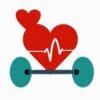11 Best Plant-Based Protein Sources for Muscle Building: Shocking Results Revealed
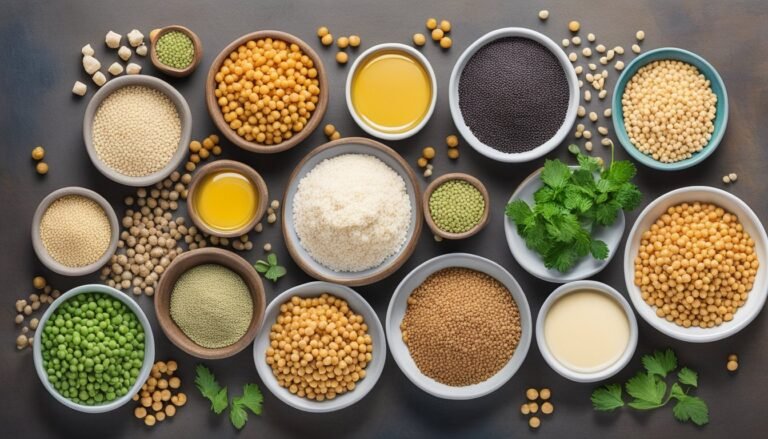
Are you tired of the same old protein sources? Looking to build muscle on a plant-based diet? You’re in luck! Plant-based eating is on the rise, and for good reason.
It’s not just about saving animals or the planet – it’s about your health too.
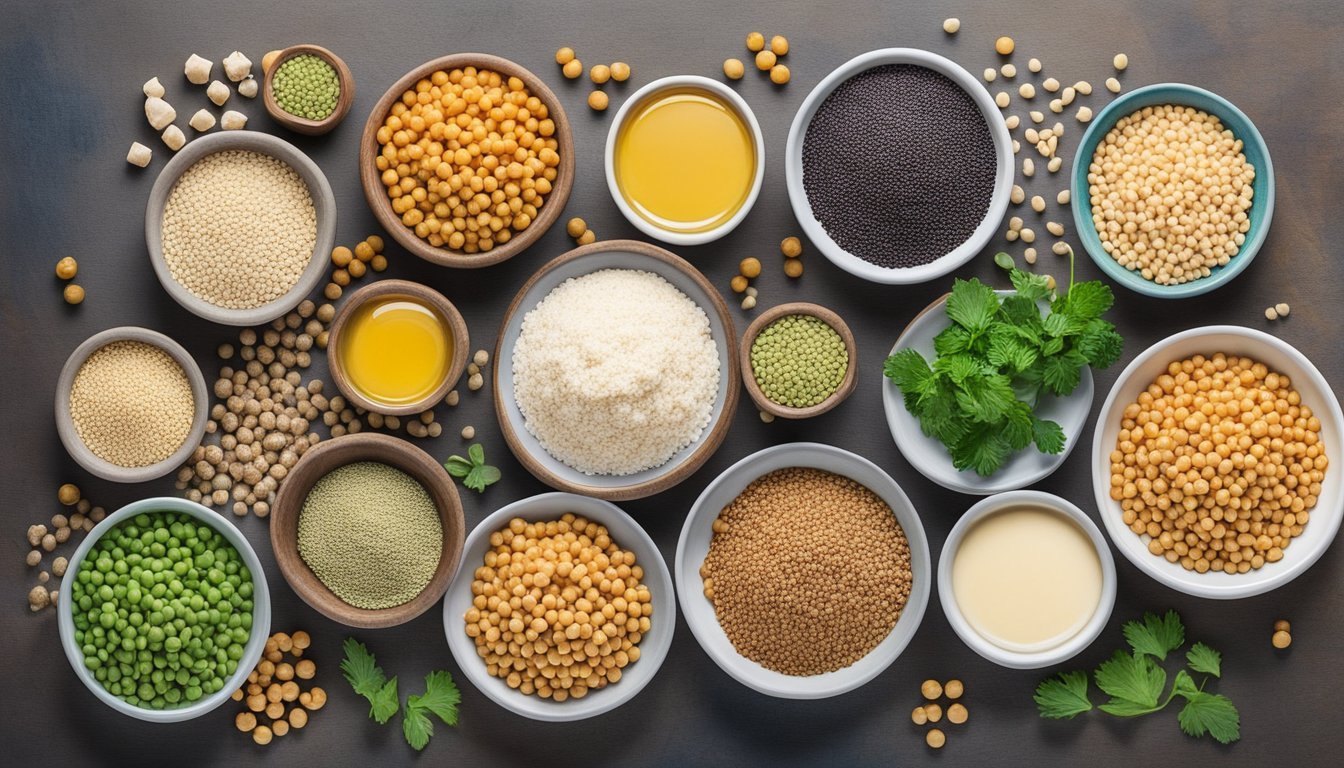
You can absolutely build strong, lean muscle on a plant-based diet. The key is knowing which foods pack the biggest protein punch.
From beans to quinoa, nature offers plenty of options to fuel your gains.
Ready to discover the best plant-based protein sources for your muscle-building journey? Let’s dive in and supercharge your plant-based gains with these powerhouse foods!
1) Tofu
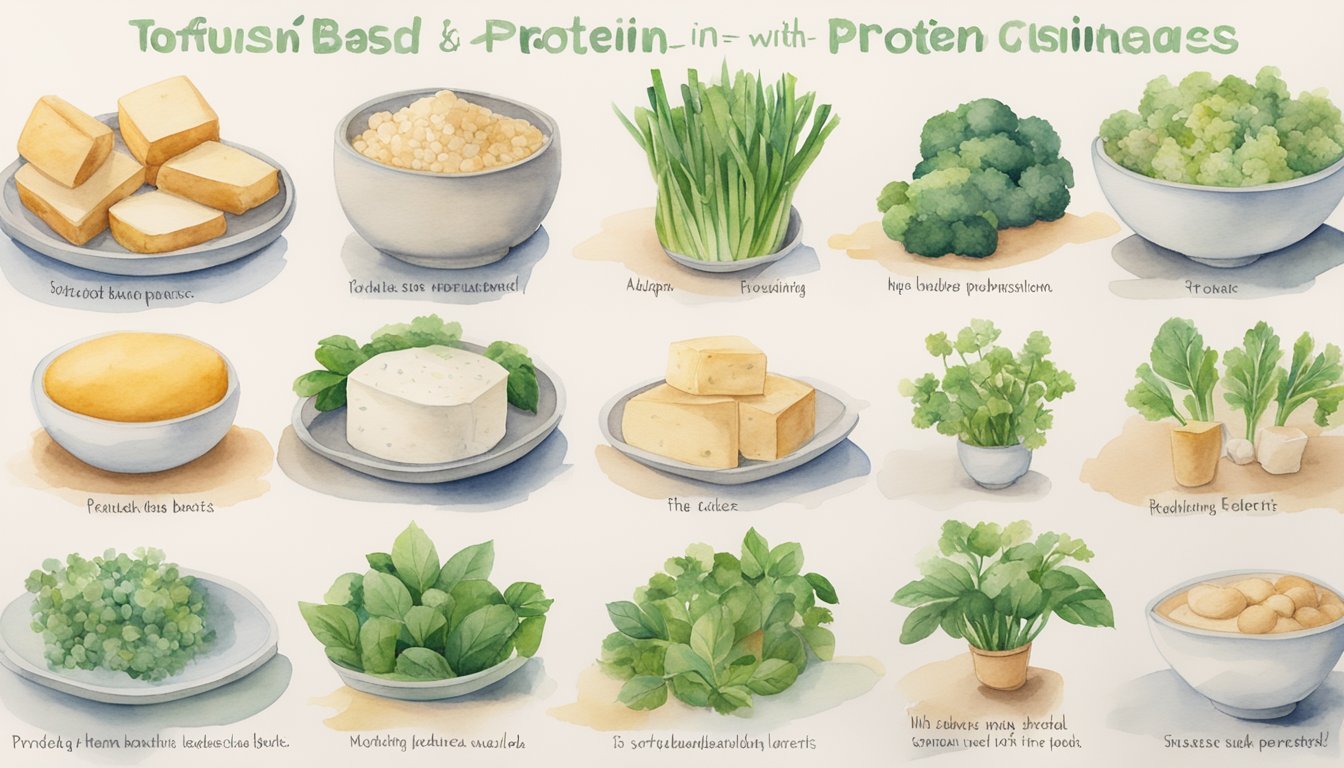
Tofu is a powerhouse for muscle building.
It’s packed with protein, making it a great choice for your post-workout meals. Tofu contains about 8 grams of protein per 100 grams, giving you a solid boost for muscle repair and growth.
You’ll find tofu easy to prepare and versatile in recipes.
It can be grilled, baked, or added to stir-fries.
This flexibility makes it simple to include in your daily diet.
Tofu is not just about protein.
It’s also rich in calcium, which is key for strong bones.
This matters because you need a solid foundation to support your growing muscles.
Another benefit of tofu is its low fat content.
This means you can eat more of it without worrying about excess calories.
It’s a smart choice when you’re trying to build lean muscle mass.
Tofu also contains all nine essential amino acids.
Your body needs these to build and repair muscle tissue.
By eating tofu, you’re giving your body the building blocks it needs for muscle growth.
You might wonder about tofu’s taste.
It’s mild, which means it takes on the flavors of the foods and spices you cook it with.
This makes it easy to create tasty, protein-rich meals that support your strength training.
2) Tempeh
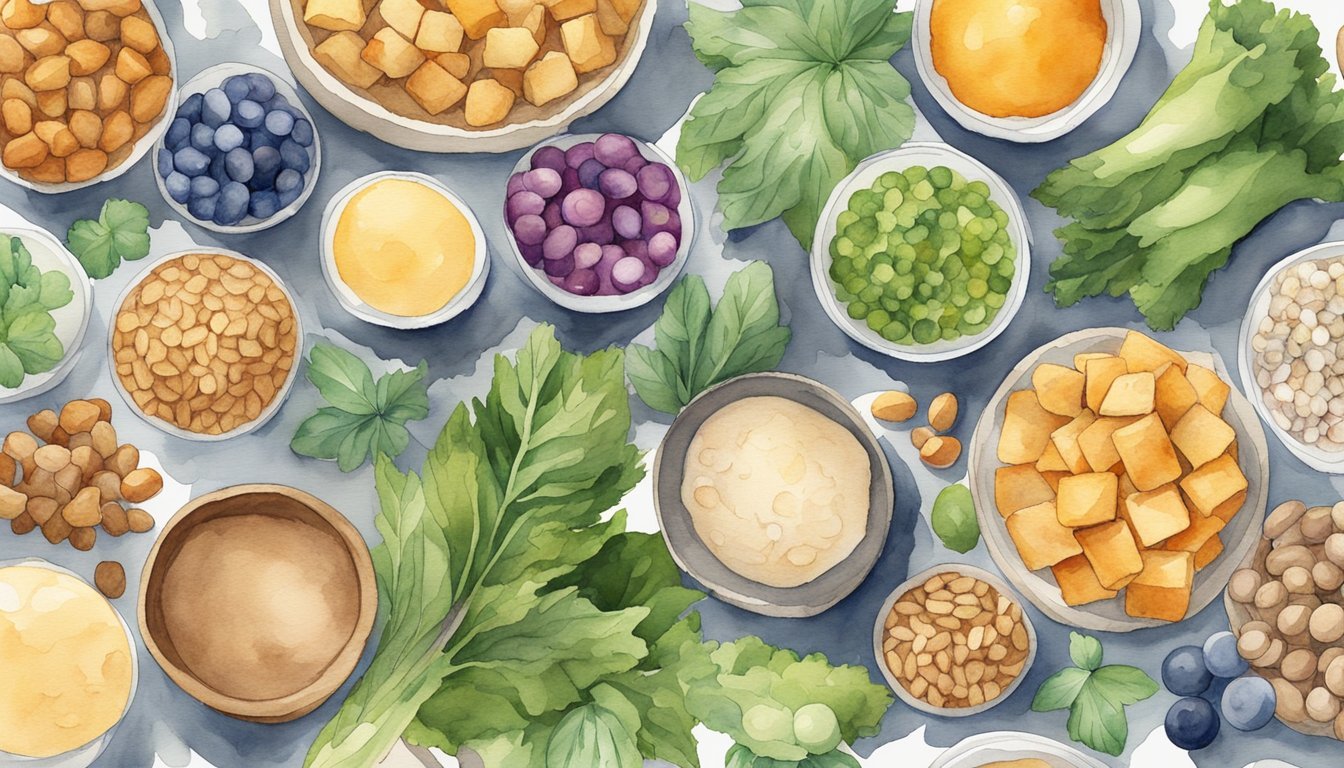
Tempeh is a powerhouse plant-based protein for muscle building.
This fermented soybean product packs a serious protein punch, with about 16 grams of protein per 3-ounce serving.
That’s comparable to many meat sources.
The protein in tempeh is complete, meaning it contains all essential amino acids your body needs.
This makes it an excellent choice for vegan bodybuilding.
Tempeh is also low in fat compared to most meat sources.
This can help you maintain a lean physique while building muscle.
It’s rich in vitamins and minerals too, supporting overall health.
The fermentation process used to make tempeh breaks down some of the proteins into amino acids.
This can make it easier for your body to absorb and use the protein.
Tempeh is versatile in the kitchen.
You can grill, fry, or bake it.
Try adding it to stir-fries, sandwiches, or salads for a protein boost.
If you’re looking to amp up your muscle-building routine, consider adding tempeh to your diet.
It’s an effective way to get the protein you need from plant sources.
For more tips on building muscle with plant-based proteins, check out some expert resources.
3) Seitan
Seitan is a powerhouse protein source for plant-based muscle building.
It’s made from wheat gluten and packs an impressive protein punch.
A 3.5 oz serving of seitan contains about 25 grams of protein.
This makes it one of the most protein-dense plant foods you can eat.
Seitan has a meaty texture that many find satisfying.
You can use it in various dishes as a meat substitute.
It’s versatile and takes on flavors well.
One benefit of seitan is its low fat content.
This can help you meet your protein needs without adding excess calories to your diet.
Seitan is also a good source of iron.
Iron is important for muscle function and overall health.
Getting enough iron can support your workouts and recovery.
You can make seitan at home or buy it pre-made.
If you make it yourself, you have control over the ingredients and flavors.
When choosing store-bought seitan, check the label.
Some brands add extra protein or nutrients.
This can boost its muscle-building potential even further.
For recipe ideas and more info on incorporating seitan into your diet, check out this complete guide to building muscle with seitan.
Remember to pair seitan with other plant foods.
This ensures you get a full range of amino acids and nutrients for optimal muscle growth.
4) Lentils
Lentils are a powerhouse of plant-based protein for muscle building.
With about 18 grams of protein per cooked cup, they pack a serious punch.
You’ll find lentils easy to add to your meals.
They cook quickly and blend well with many dishes.
Try adding them to soups, salads, or as a side dish.
Lentils are also rich in fiber, which aids digestion and keeps you feeling full.
This can help you manage your weight while building muscle.
These little legumes come in various colors – green, brown, red, and black.
Each type has a slightly different flavor and texture.
Experiment to find your favorite.
Lentils provide more than just protein.
They’re loaded with iron, folate, and potassium.
These nutrients support overall health and can boost your workout performance.
For muscle growth, pair lentils with other protein sources.
This mix can improve muscle protein synthesis, helping you build lean mass more effectively.
Remember to soak dried lentils before cooking.
This makes them easier to digest and allows your body to absorb more nutrients.
Canned lentils are also a quick option if you’re short on time.
5) Chickpeas
Chickpeas are a powerhouse of plant-based protein for muscle building.
These versatile legumes pack a nutritional punch that can help you reach your fitness goals.
A single cup of cooked chickpeas gives you about 15 grams of protein.
This makes them an excellent choice for boosting your protein intake on a plant-based diet.
Chickpeas also provide complex carbohydrates.
These give you lasting energy for your workouts and help replenish glycogen stores in your muscles after exercise.
You’ll find chickpeas are rich in fiber too.
This aids digestion and keeps you feeling full, which can help with weight management as you build muscle.
These little beans are packed with vitamins and minerals.
They contain iron, magnesium, and potassium – all important for muscle function and recovery.
Adding chickpeas to your diet is easy.
You can toss them in salads, blend them into hummus, or roast them for a crunchy snack.
They also work well in soups and stews.
For a quick protein boost, try adding chickpea flour to your smoothies.
It’s a simple way to increase the protein content of your post-workout shake.
Remember, variety is key in a muscle-building diet.
While chickpeas are great, mix them with other plant proteins for a complete amino acid profile.
6) Black Beans
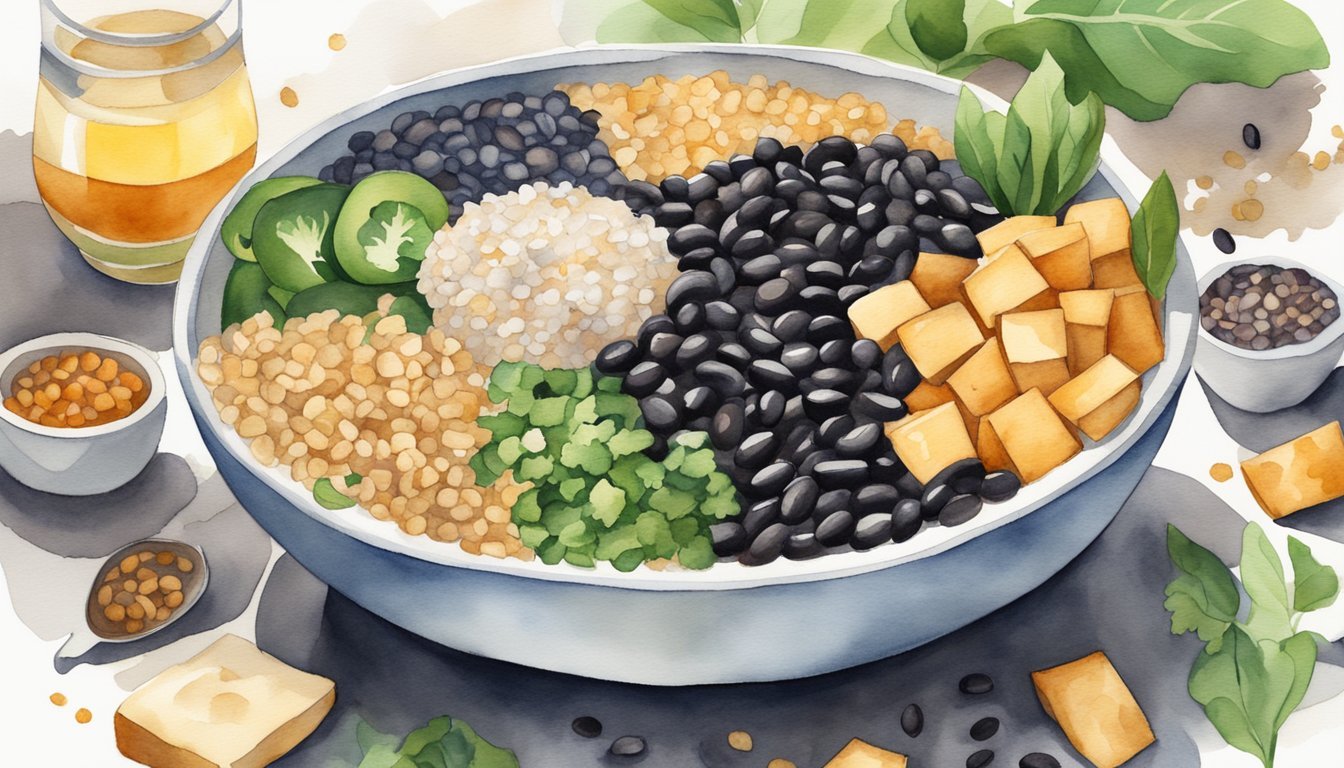
Black beans are a great choice for muscle building.
They pack a protein punch with about 15 grams per cup.
This makes them an excellent option for your plant-based diet.
These beans are also rich in carbs.
This combo of protein and carbs helps fuel your workouts and aids in muscle recovery.
You’ll find they keep you feeling full for longer too.
Black beans contain fiber, which is good for your gut health.
They also provide iron, which helps carry oxygen to your muscles.
This can boost your workout performance.
You can easily add black beans to many meals.
Try them in salads, soups, or as a side dish.
They’re versatile and blend well with different flavors.
For the best results, pair black beans with other protein sources.
This gives you a fuller range of amino acids.
Consider adding them to a meal with rice or quinoa for a complete protein.
Remember to rinse canned black beans before use.
This reduces sodium content.
You can also cook dried beans at home for a more budget-friendly option.
Include black beans in your diet a few times a week.
They’re an easy way to boost your protein intake and support your muscle-building goals.
7) Quinoa
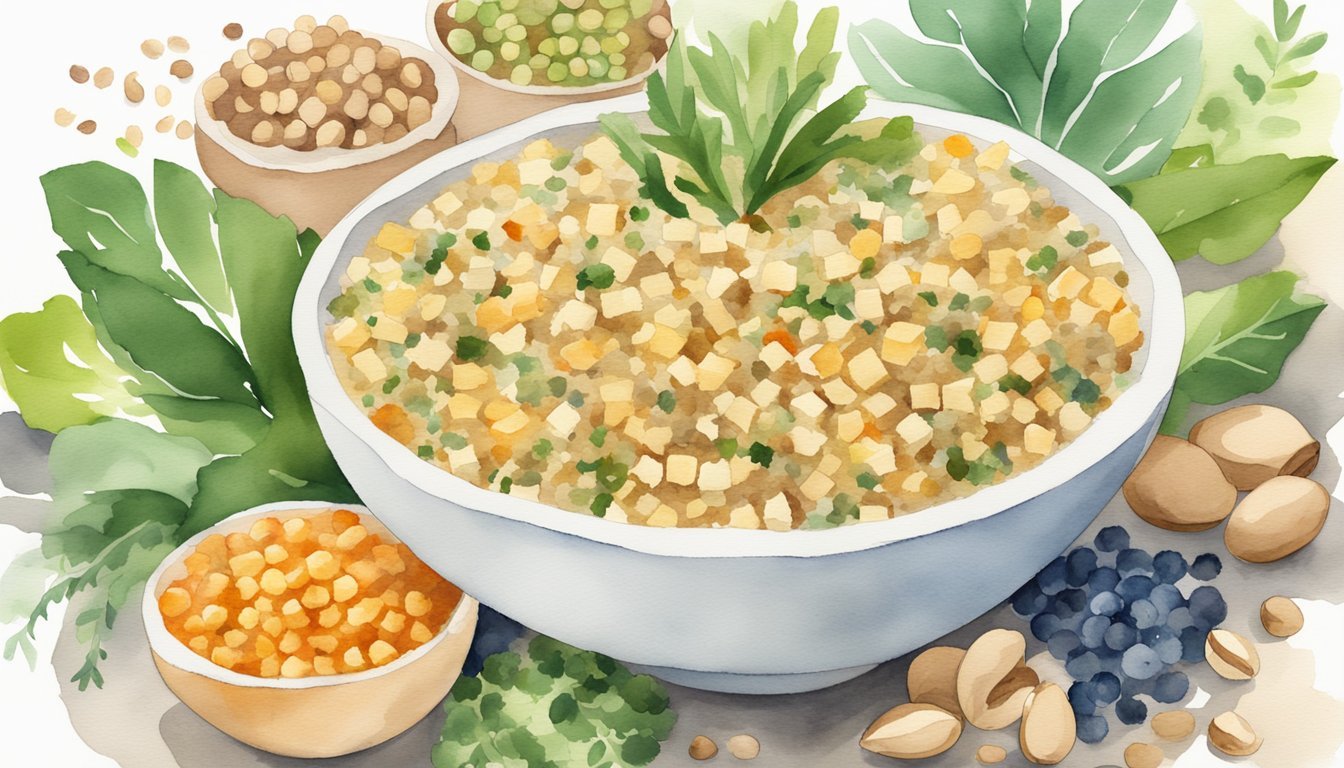
Quinoa is a powerhouse grain that can help you build muscle.
It’s one of the few plant-based foods that contains all nine essential amino acids, making it a complete protein source.
This versatile seed packs about 8 grams of protein per cup when cooked.
You can easily add it to your meals as a side dish or base for grain bowls.
Quinoa also provides complex carbohydrates to fuel your workouts.
It’s rich in fiber, which aids digestion and helps you feel full.
You’ll get a good dose of iron from quinoa too.
Iron is crucial for delivering oxygen to your muscles during exercise.
To prepare quinoa, rinse it well and cook it like rice.
Use a 2:1 ratio of water to quinoa.
Simmer for about 15 minutes until the water is absorbed.
Try mixing quinoa with beans, vegetables, and your favorite seasonings for a protein-packed meal.
You can also add it to smoothies or use it in place of oats for breakfast.
Remember to pair quinoa with other protein sources throughout the day.
This ensures you get enough total protein to support muscle growth.
8) Hemp Seeds
Hemp seeds are a powerhouse of plant-based protein.
You’ll get about 9.5 grams of protein in just 3 tablespoons of hulled hemp seeds.
That’s a good amount for such a small serving.
These tiny seeds pack more than just protein.
They’re also rich in healthy fats, including omega-3s.
You’ll find fiber in hemp seeds too, which is great for your digestion.
Hemp protein powder is another option if you want to boost your protein intake.
It’s made from ground hemp seeds and offers similar benefits. Some varieties provide up to 20 grams of protein per serving.
You can easily add hemp seeds to your meals.
Sprinkle them on salads, blend them into smoothies, or mix them into yogurt.
They have a mild, nutty taste that goes well with many foods.
Hemp seeds are also good for athletes and those looking to build muscle.
The protein in hemp is complete, meaning it has all nine essential amino acids your body needs.
If you’re curious about trying hemp protein powder, there are many options available. Some brands offer organic, non-GMO products that can fit into various diets.
Remember, hemp seeds and hemp protein are different from marijuana.
They won’t make you high or cause any psychoactive effects.
They’re safe and legal to consume.
9) Chia Seeds
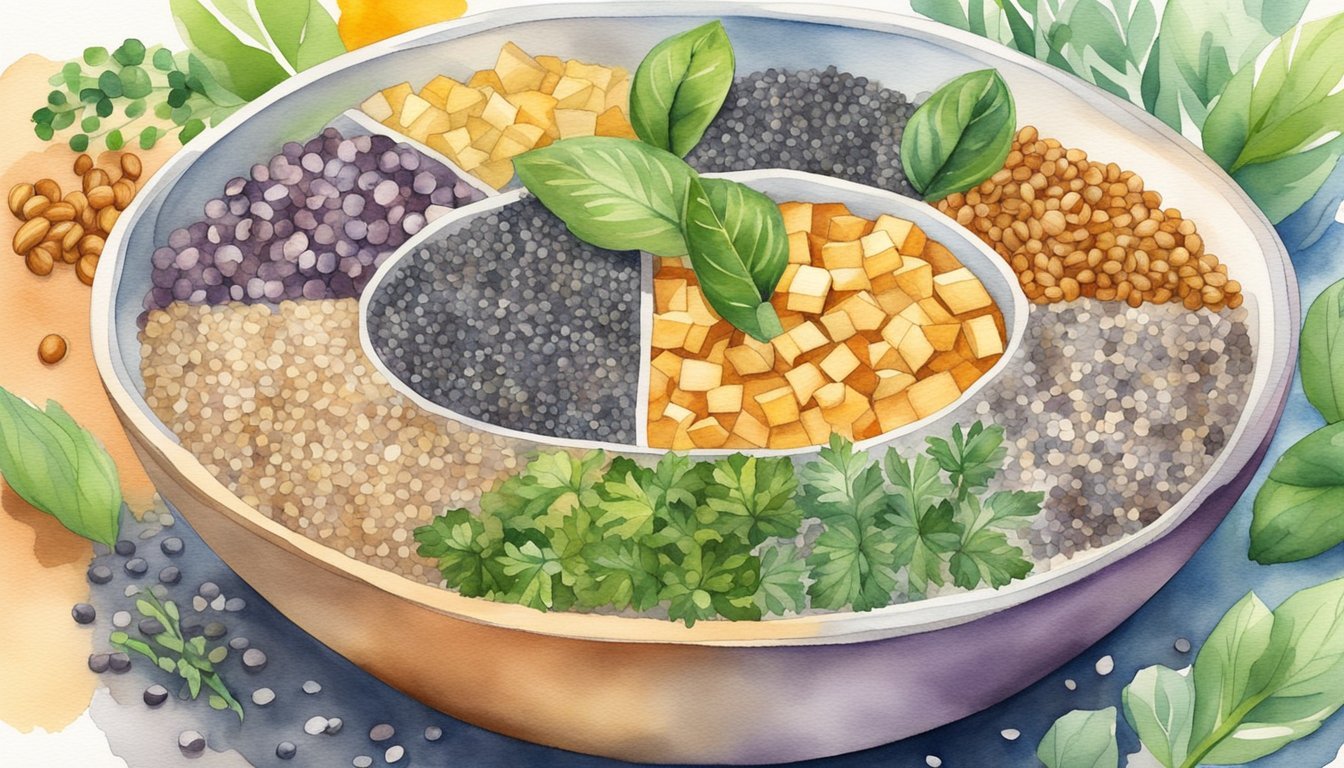
Chia seeds are a tiny powerhouse for muscle building.
These small seeds pack a big protein punch, with about 4.7 grams of protein per ounce.
They’re also rich in fiber, healthy fats, and minerals.
You can easily add chia seeds to your diet.
Try sprinkling them on yogurt, oatmeal, or smoothies.
They absorb liquid and form a gel-like texture, making them great for puddings and energy gels.
Chia seeds contain all nine essential amino acids.
This makes them a complete protein source, which is rare for plant-based foods.
Your body needs these amino acids to build and repair muscle tissue.
The high fiber content in chia seeds helps with digestion and keeps you feeling full.
This can be helpful when you’re trying to manage your calorie intake while building muscle.
Chia seeds are also rich in omega-3 fatty acids.
These healthy fats can help reduce inflammation in your body after intense workouts.
This may aid in muscle recovery and growth.
Remember to drink plenty of water when eating chia seeds.
They absorb a lot of liquid, which can help you stay hydrated during your workouts.
Just one ounce of chia seeds can absorb up to 10 times their weight in water.
10) Pumpkin Seeds
Pumpkin seeds are a powerhouse of plant-based protein.
They pack a punch with about 7 grams of protein per ounce.
This makes them an excellent choice for muscle building.
You’ll find that pumpkin seeds are rich in essential amino acids.
These building blocks of protein are crucial for muscle growth and repair.
Adding pumpkin seeds to your diet can help support your fitness goals.
Pumpkin seeds also offer other health benefits.
They’re high in iron, zinc, and magnesium.
These minerals play key roles in muscle function and recovery.
You can easily add pumpkin seeds to your meals.
Sprinkle them on salads, blend them into smoothies, or eat them as a snack.
Their versatility makes them a convenient protein source.
For those following a plant-based diet, pumpkin seeds are especially valuable.
They provide a complete protein, which is rare in plant foods.
This means they contain all nine essential amino acids your body needs.
If you’re looking to boost your protein intake, consider pumpkin seed protein powder.
It’s a great alternative to traditional protein supplements.
You can mix it into shakes or use it in baking for an extra protein boost.
Remember, consistency is key when it comes to muscle building.
Include pumpkin seeds in your regular diet to reap their full benefits.
11) Pea Protein Powder
Pea protein powder is a popular plant-based protein option.
It’s made by extracting protein from yellow split peas.
This powder can be a great addition to your muscle-building routine.
One of the main benefits of pea protein is its amino acid profile.
It contains all nine essential amino acids your body needs.
This makes it a complete protein source for building muscle.
Pea protein is especially high in branched-chain amino acids (BCAAs).
These are important for muscle repair and growth.
You’ll find good amounts of leucine, isoleucine, and valine in pea protein powder.
Another plus is that pea protein is easily digestible.
Many people find it gentler on their stomachs compared to other protein powders.
This can be helpful if you have sensitive digestion.
Pea protein powder is also versatile and easy to use.
You can mix it into smoothies, oatmeal, or baked goods.
Some people even use it in savory dishes like soups or sauces.
When choosing a pea protein powder, look for ones with minimal ingredients.
The best options are often unflavored and unsweetened.
This lets you control the taste and sweetness yourself.
Remember to pair your pea protein intake with a balanced diet and regular exercise.
This combo will help you get the most out of your muscle-building efforts.
Benefits of Plant-Based Proteins for Muscle Building
Plant-based proteins offer valuable advantages for muscle growth.
They provide essential nutrients and are easily absorbed by the body.
Nutritional Value
Plant-based proteins pack a nutritional punch.
Many are complete proteins, containing all nine essential amino acids your body needs.
These proteins often come with extra benefits like fiber, vitamins, and minerals.
Pea protein, for example, is rich in iron and branched-chain amino acids (BCAAs).
BCAAs are crucial for muscle repair and growth.
Soy protein offers a hefty dose of antioxidants along with its protein content.
Plant proteins are typically lower in saturated fat compared to animal proteins.
This can help you maintain a healthy weight while building muscle.
Many also contain heart-healthy fats, supporting your overall fitness goals.
Digestibility and Absorption
Your body can easily digest and use plant-based proteins.
Many plant proteins have a high biological value, meaning your body can absorb and use a large portion of the protein you consume.
Some plant proteins, like pea and rice protein, are quickly absorbed.
This makes them great for post-workout recovery.
Your muscles can start repairing and growing sooner after exercise.
Plant proteins are often gentler on your stomach than animal proteins.
This can be especially helpful if you have digestive sensitivities.
Less digestive stress means your body can focus more energy on muscle building.
Mixing different plant proteins can improve their overall absorption.
For example, combining rice and pea protein creates a more complete amino acid profile.
This strategy helps ensure you’re getting all the building blocks your muscles need.
How Plant-Based Proteins Support Muscle Growth
Plant-based proteins can help build muscle just like animal proteins.
They have key building blocks your body needs.
Mixing different plant proteins gives you all the amino acids for strong muscles.
Amino Acid Profiles
Plant proteins contain essential amino acids your body can’t make on its own.
These are the building blocks for muscle growth.
Some plant proteins like soy and quinoa have all nine essential amino acids.
Other plant proteins may be low in one or two amino acids.
But that’s okay.
Your body is smart and can use amino acids from different meals throughout the day.
Beans, lentils, and peas are high in lysine.
Nuts and seeds give you lots of methionine.
Eating a mix of these foods helps you get a full amino acid profile.
Combining Protein Sources
Eating different plant proteins together gives you all the amino acids you need.
This is called protein combining.
It’s not as hard as it sounds.
Here are some easy combos:
- Rice and beans
- Whole grain bread with nut butter
- Hummus and pita
You don’t need to combine proteins at every meal.
Eating varied plant proteins throughout the day works too.
Plant-based diets can give you enough protein for muscle growth.
The key is eating a variety of protein-rich plants.
This gives your body all the amino acids it needs to build and repair muscle.
Tips for Incorporating Plant-Based Proteins into Your Diet
Adding plant proteins to your meals can boost muscle growth and overall health.
Try new foods and recipes to make your diet more diverse and nutritious.
Pre and Post-Workout Nutrition
Fuel your workouts with plant-based proteins for better results.
Before exercising, eat a small meal with easily digestible proteins and carbs.
Try a smoothie with plant protein powder and fruit.
After your workout, refuel with a protein-rich snack.
Good options include:
- Hummus with veggie sticks
- Edamame
- Nut butter on whole grain toast
Aim to eat within 30 minutes of finishing exercise.
This helps your muscles recover and grow stronger.
Meal Planning and Preparation
Plan your meals to ensure you get enough plant-based protein each day.
Make a weekly menu and grocery list to stay organized.
Prep ingredients in advance to save time.
Cook large batches of beans, lentils, or quinoa to use in different meals.
Store them in the fridge or freezer for quick access.
Try new recipes to keep things interesting.
Experiment with tofu, tempeh, or seitan as meat substitutes in your favorite dishes.
Add nuts and seeds to salads or oatmeal for extra protein and crunch.
Keep plant-based protein snacks on hand for busy days.
Stock up on:
- Mixed nuts
- Roasted chickpeas
- Plant-based protein bars
This way, you’ll always have a protein-rich option available when hunger strikes.
Frequently Asked Questions
Plant-based diets can provide plenty of protein for muscle building.
The key is choosing high-quality sources and eating enough calories.
Let’s explore some common questions about vegan muscle gain.
How can female athletes build muscle on a plant-based diet?
Female athletes can build muscle on plant-based diets by eating enough protein and calories.
Aim for 1.6-2.2 grams of protein per kg of body weight daily.
Include protein-rich foods like tofu, tempeh, and lentils with each meal.
Strength training is crucial.
Lift weights 3-4 times per week, focusing on compound exercises.
Rest and recovery are also important for muscle growth.
What is the most effective plant protein for gaining muscle?
Soy protein is one of the most effective plant proteins for muscle gain.
It’s a complete protein with all essential amino acids.
Soy foods like tofu and tempeh are great choices.
Pea protein is another top option.
It’s rich in branched-chain amino acids that support muscle growth.
Try a plant-based protein powder with pea protein for convenience.
Which plant-based dietary plan is optimal for muscle growth in vegans?
A whole foods, plant-based diet with adequate protein and calories works well for muscle growth.
Eat plenty of legumes, whole grains, nuts, and seeds.
Include protein-rich foods at every meal.
Aim for 1.6-2.2 grams of protein per kg of body weight daily.
Eat enough total calories to support muscle gain.
Track your intake to ensure you’re meeting your needs.
What are essential supplements to consider for muscle building in a vegan lifestyle?
Key supplements for vegan muscle building include:
- Vitamin B12
- Vitamin D
- Omega-3 fatty acids (from algae oil)
- Creatine
- Plant-based protein powder
A multivitamin can help fill any nutrient gaps.
Consult a doctor before starting any new supplements.
What high-protein vegetarian foods are recommended for muscle building?
Top high-protein vegetarian foods for muscle building include:
- Tofu and tempeh
- Seitan (wheat protein)
- Lentils and beans
- Chickpeas
- Quinoa
- Greek yogurt and cottage cheese (for lacto-vegetarians)
Combine these foods throughout the day to meet your protein needs.
How does plant protein compare to animal protein in terms of muscle building efficacy?
Plant proteins can be just as effective as animal proteins for building muscle.
The key is eating enough total protein and calories.
Plant proteins may have slightly lower digestibility, so aim for the higher end of protein recommendations.
Soy protein has been shown to be as effective as whey protein for muscle gain.
Combining different plant proteins ensures you get all essential amino acids.
With proper planning, you can build muscle just as well on a plant-based diet.


